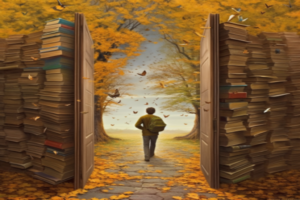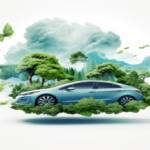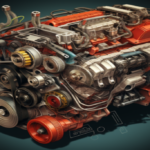1. “Man’s Search for Meaning” by Viktor E. Frankl:
A harrowing chronicle of Frankl’s experiences as a prisoner in Nazi concentration camps during World War II, this book introduces us to logotherapy, a mode of psychotherapy that insists on the search for life’s purpose. Frankl’s insight emphasizes that meaning can be found in life even in the most brutal circumstances, fundamentally altering the way one views adversity and hardship.
2. “To Kill a Mockingbird” by Harper Lee:
This Pulitzer Prize-winning novel explores the profound issues of race, class, and morality through the innocent eyes of a young girl named Scout. By portraying the injustice and prejudice in society, it prompts readers to question their own beliefs and attitudes towards others.
3. “1984” by George Orwell:
A dystopian novel that paints a chilling picture of totalitarianism, Orwell’s work encourages readers to critically examine power structures, individuality, and the importance of free thought. It compels us to value our freedoms and stay vigilant against any signs of their erosion.
4. “The Alchemist” by Paulo Coelho:
This allegorical novel encourages readers to pursue their dreams and listen to their hearts. The journey of a young shepherd named Santiago serves as a metaphor for people’s quest for purpose and fulfillment. This book redefines the meaning of personal success and destiny.
5. “Sapiens: A Brief History of Humankind” by Yuval Noah Harari:
Harari’s work offers a comprehensive exploration of human history from the evolution of Homo Sapiens in the Stone Age up to the twenty-first century. This book forces us to question our understanding of ideas like freedom, happiness, and progress, and changes our perspective on our place in the world.
6. “Meditations” by Marcus Aurelius:
Written by the Roman Emperor himself, this set of personal writings serves as an introduction to Stoic philosophy. Aurelius’ reflections on resilience, virtue, and death provide profound insights into the human condition, encouraging us to accept things as they are and focus on what is within our control.
7. “Thinking, Fast and Slow” by Daniel Kahneman:
Kahneman’s exploration of the two systems that drive the way we think—fast, intuitive thinking, and slow, deliberate thinking—provides readers with a new understanding of the mind. It changes our perspective on decision-making, biases, and cognitive errors.
8. “The Power of Now” by Eckhart Tolle:
This spiritual guidebook encourages readers to live in the present moment and free themselves from past regrets and future anxieties. It offers a transformative view of personal growth and happiness, placing importance on mindfulness and acceptance.
9. “Silent Spring” by Rachel Carson:
This groundbreaking environmental science book from 1962 initiated the global environmental movement. It altered the way society views and interacts with nature, reminding us of the interconnectivity of all living things and our responsibility to protect the earth.
10. “Between the World and Me” by Ta-Nehisi Coates:
Written as a letter to his teenage son, Coates’ work explores the reality of being Black in the United States. It forces readers to confront the long shadow of racial inequality, providing a stark and necessary shift in perspective on racial dynamics in America.
These books, spanning across different genres and periods, provide profound insights into life, humanity, and our role in the world. By challenging our preconceived notions and deepening our understanding of complex issues, they have the power to change our perspectives on life.







